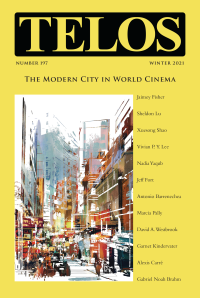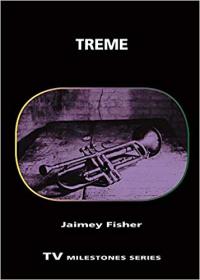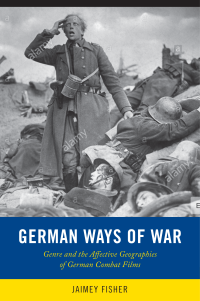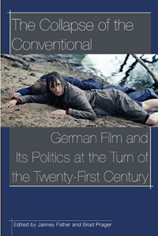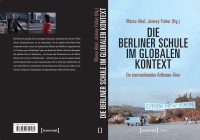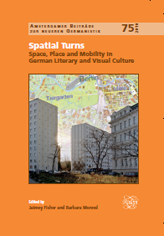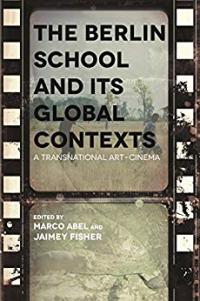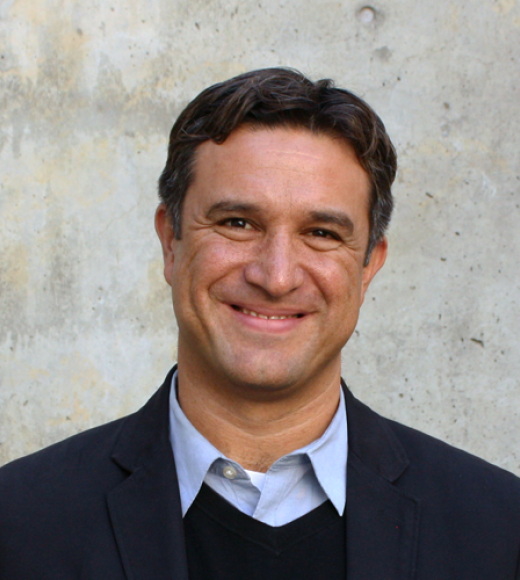
Position Title
Professor of German
Professor and Chair of Cinema & Digital Media
Director of the UC Humanities Research Institute (UCHRI)
Education and Degree(s):
- Ph.D., Cornell University
- M.A., Cornell University
- A.B. (with Honors and Distinction), Stanford University
Research Interest(s):
- Film and media studies
- German literature
- Intellectual history
Profile:
Jaimey Fisher is Professor of German and Cinema and Digital Media. He studied German literature and thought at Stanford University, at the Freie Universität Berlin, and at Cornell University, where he received his Ph.D. with an emphasis in German intellectual history as well as in Film and Video Studies. His primary research and teaching interests include film and media studies, German literature, and intellectual history.
Prof. Fisher is the author of four single-authored books: German Ways of War: The Affective Geographies and Generic Transformations of German War Films (Rutgers UP, 2022); Treme (Wayne State University, 2019), Christian Petzold (University of Illinois, 2013) and Disciplining Germany: Youth, Reeducation, and Reconstruction after the Second World War (Wayne State University, 2007). He has also edited or co-edited seven books or special issues, including on film (The Modern City in World Cinema (Telos special issue 2021); Berlin School and its Global Contexts: A Transnational Art Cinema [2018, Wayne State UP]; Generic Histories of German Cinema: Genre and its Deviations [2013, Camden House's Screen series], and Collapse of the Conventional: German Cinema and its Politics at the Turn of the Twenty-First Century [2010, Wayne State UP]) as well as on literature and theory (Spatial Turns: Space, Place, and Mobility in German Literary and Visual Culture [2010, Rodopi] and Critical Theory: Current State and Future Prospects [2001, Berghahn]). He is now working on a project on media, especially television, and democratization in the Germanys and Austria in the 1950s and 1960s.
He has also published over 50 articles and book chapters, including in the journals New German Critique, The German Quarterly, Seminar, Iris, The Goethe Yearbook, and Zeitschrift für Germanistik, among others.
Prof. Fisher teaches courses at UC Davis in German and Cinema and Digital Media, on topics ranging from Bertolt Brecht to contemporary European cinema. He has also developed a summer-abroad course for UC Davis, entitled "World Cinema and the European Film Festival," which travels to the Locarno Film Festival in southern Switzerland/northern Italy. At UC Davis, Prof. Fisher is an affiliated faculty member in Critical Theory, Cultural Studies, Performance Studies, and Jewish Studies.
Before coming to Davis in 2004, Prof. Fisher taught at Tulane University as an Assistant Professor of German. He has held two fellowships from the German Academic Exchange Service (the DAAD) and was awarded a Federal Chancellor (Bundeskanzler or Buka) Fellowship from the Alexander von Humboldt Foundation; he has also PI’d (as Lead PI) assorted grants from the Mellon Foundation, the National Endowment of the Humanities, and California Humanities.
Video Links:
Professor Fisher at the Munich Film Festival masterclass with Director Christian Petzold and Senior Programmer Robert Fischer (July 2016; in German):
https://www.youtube.com/watch?v=9iDFHfiA7vo&t=114s
Professor Fisher presenting at the United Nations in New York on German reeducation after World War II (January 2017):
https://media.un.org/en/asset/k1p/k1ptyw5b98
Books, single-authored:
German Ways of War: The Affective Geographies and Generic Transformations of German War Films(Rutgers UP, 2022)
Treme (Wayne State University Press, 2019; Television Milestone Series)
Christian Petzold (University of Illinois Press, 2013; Contemporary Film Directors series)
Disciplining Germany: Youth, Reeducation, and Reconstruction after the Second World War (Wayne State University Press, Kritik series, 2007)
Books and journal issues, edited or co-edited
Editor, German Ways of War: The Affective Geographies and Generic Transformations of German War Films(Rutgers UP, 2022)
Co-editor, Berlin School and its Global Contexts: A Transnational Art Cinema (Detroit: Wayne State University Press, 2018). Co-editor with Marco Abel. Short-listed for Willy Haas Prize for significant publication on German Cinema, 2018 (only book in English on short-list); being translated for publication in German by Transcript Verlag (confirmation available).
Co-editor, Dossier: Christian Petzold (Senses of Cinema, Issue 84, Fall 2017).
Co-editor with Marco Abel.
Editor, Generic Histories of German Cinema: Film Genre and its Deviations (Rochester:
Camden House, 2013).
Co-editor, Spatial Turns: Space, Place, and Mobility in German Literary and Visual Culture, co-
editor with Barbara Mennel (Amsterdamer Beiträge, Rodopi, 2010).
Co-editor, The Collapse of the Conventional: German Film and its Politics at the Turn of the
Twenty-first Century, co-editor with Brad Prager (Detroit: Wayne State Press, 2010).
Co-editor, Critical Theory: Current State and Future Prospects, co-editor with Peter Uwe Hohendahl (New York: Berghahn Press, 2001).
Selected Essays
“Disputations from a Damaged City: Spike Lee’s If God is Willing and the Creek Don’t Rise (2010) and the Taking Place of Civil Society in Post-Katrina New Orleans,” Telos 197 (Winter 2021), “Special Issue on The Modern City in World Cinema,” eds. Jaimey Fisher and Sheldon Lu, 101-23.
“Nature scaled to body: literary adaptation, space, and genre in Terence Malick’s The Thin Red Line (1998) and G.W. Pabst Westfront 1918 (1930),” New Review of Film and Television Studies 17:1 (2019). Pp. 57-80.
“Ghosts at an Early Age: Youth, Labor, and the Intensified Body in the work of Christian Petzold and the Dardennes,” in eds. Marco Abel and Jaimey Fisher, Berlin School and its Global Contexts: A Transnational Art Cinema (Wayne State UP, 2018) 271-292.
“Film and Affect, Theories Entwined: The Case of the War Genre in Saving Private Ryan (Steven Spielberg, 1998),” in eds. Donald Wehrs and Thomas Blake, The Handbook on Affect Studies and Textual Criticism (Palgrave, 2018). 509-535.
“Petzold’s Phoenix, Fassbinder’s Maria Braun, and A Melodramatic Archeology of the Rubble Past,” in Senses of Cinema: Dossier on Christian Petzold Fall 2017: (translated, English version of #4 essay below, but Senses is refereed).
“German Historical Film as Production Trend: European Heritage Cinema and Melodrama in The Lives of Others” in The Collapse of the Conventional: German Film and its Politics at the Turn of the Twenty-First Century, ed. Jaimey Fisher and Brad Prager (Wayne State University Press, 2010).
“Adorno’s Lesson-Plans? The Ethics of (Re) Education In “The Meaning of ‘Working through the Past”,” in Gerhard Richter, ed., “Language Without Soil”: Adorno and Late Philosophical Modernity (Fordham University Press, 2010).
“Home-Movies, Film-Diaries, And Mass Bodies: Péter Forgács’s Free Fall (1996) Into The Holocaust,” in David Bathrick, Brad Prager, Michael Richardson, eds., Visualizing the Holocaust: Documents, Aesthetics, and Memory (Camden House, 2008).
“On the Ruins of Masculinity: The Figure of the Child in Italian Neorealism and the German Rubble-Film,” in Laura E. Ruberto, Tomas Taraborrelli, and Kristi M. Wilson, eds., Radical Fantasy: Italian Neorealism’s Afterlife in Global Cinema (Wayne State University Press, 2007).
“Bombing Memories in Braun’s Zwischen Gestern und Morgen (1947):Flashbacks to the Recent Past in The German Rubble-Film,” in William Rasch and Wilfried Wilms, eds., Bombs Away: Representing the Air War over Europe and Japan, in series Amsterdamer Beitraege zur neueren Germanistik (Rodopi 2005): 329-43.
“Wandering In/to the Rubble-Film: Filmic Flânerie and The Exploded Panorama after 1945,” The German Quarterly 78.4 (Fall 2005): 461-80.
“Familial Politics and Political Families: Consent, Critique, and the Fraternal Social Contract in Schiller's Die Räuber,” Goethe Yearbook (2005): 75-103.
“Globalisierungsbewältigung: Global Flows and Local Loyalties in Contemporary German Cinema," special issue on "Globalization and the Image,” Genre XXXVI/3-4 (Fall/Winter 2003): 405-28.
